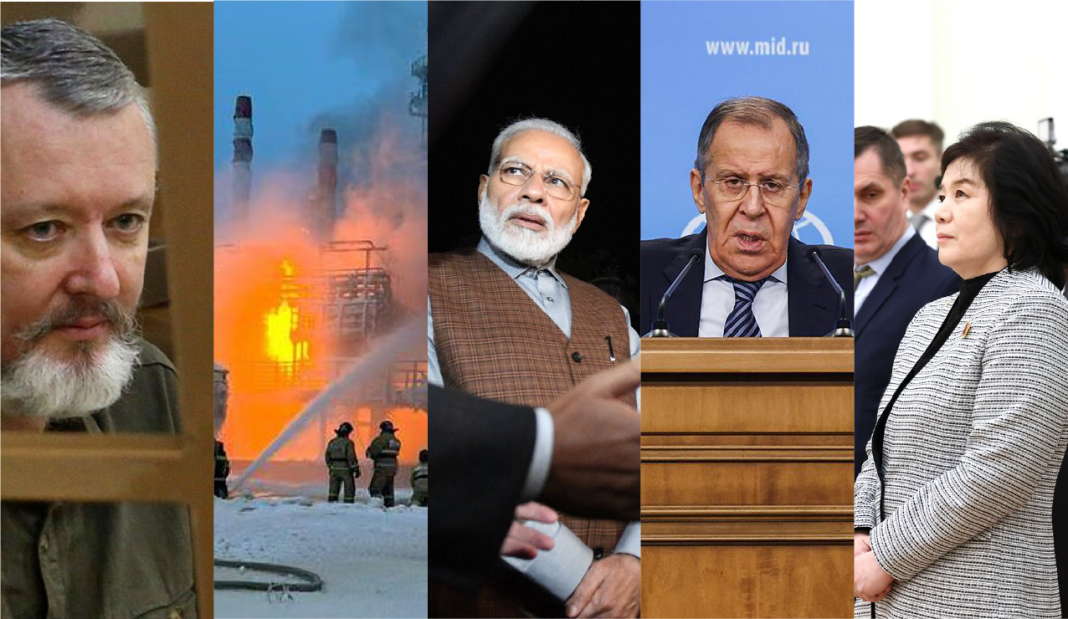This report describes the key events significantly influencing Russia’s political, economic, and social processes.
Assessing the past week’s results, we identify the following trends:
- The Asia-Pacific region is undergoing truthfully fundamental changes. Recent years show that the centre of geopolitical and economic relations is increasingly tiling towards Asia and the Middle East. In this case, Putin’s game attempts to become the conditional “not first, but not second” in the region. This task is practically unrealistic against several states with stronger economies and industrial potential, but strengthening ties with conditional rogue states can bring results.
- According to Ascolta, Putin demanded from his entourage and the Foreign Ministry more active work in the international direction. “We must get out of the defensive state; we must go on the offensive on all foreign policy fronts, and the past year has given us reason to say that such a strategy is ripe.” According to reports, even before the presidential elections, the Foreign Ministry must provide an action plan to strengthen its position in the world: in addition to strengthening cooperation within the BRICS, with China, in the regions of Africa, the Middle East and Central Asia, Putin asked to develop a concept of interaction with Europe and a concept of possible compromises from the USA.
- Many experts perceive the final press conference of Sergei Lavrov on the results of 2023 as the “swan song” of Lavrov, who is predicted to resign after the 2024 presidential elections. But overall, Lavrov painted a bravura picture in the style of “We are stronger than ever.” In any case, the theses voiced during this press conference will form the basis of recommendations for agitators leading a campaign to promote Vladimir Putin for the next presidential term.
This report highlights the following most relevant for Russia matters, which occurred during 15-21 January:
1. Telephone conversation between Vladimir Putin and Narendra Modi;
2. Meeting of Vladimir Putin with the Minister of Foreign Affairs of the DPRK Choe Son-Hui;
3. Meeting with government members;
4. Meeting with permanent members of the Security Council;
5. Press conference of Sergei Lavrov on the results of the activities of the Russian Ministry of Foreign Affairs;
6. Explosions in the Leningrad region;
7. Sentence to Igor Strelkov.
This Content Is Only For Subscribers
- Telephone conversation between Vladimir Putin and Narendra Modi
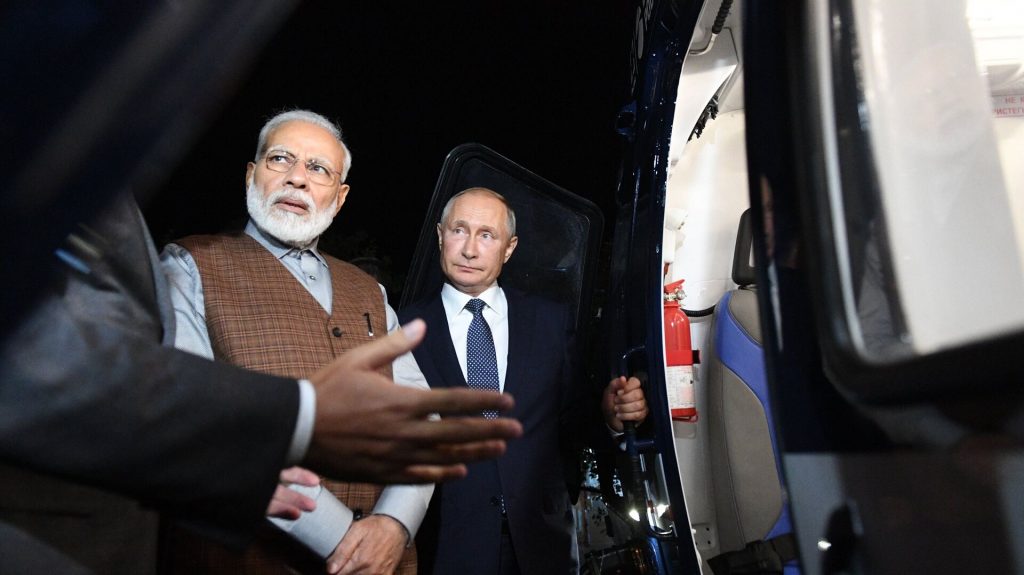
On Monday, January 15, Vladimir Putin had a telephone conversation with Indian Prime Minister Narendra Modi. According to official statements of the parties, Putin and Modi discussed developing Russian-Indian relations as a particularly privileged strategic partnership. The emphasis was placed on practical interaction in trade, economic, scientific and technical cooperation, energy, transport and logistics, and cooperation in the Russian Far East.
It is noted that the parties expressed interest in further intensifying mutually beneficial bilateral ties and wished each other success in the upcoming elections – presidential in Russia and parliamentary in India. Issues related to BRICS and Russia’s chairmanship in this organisation were also discussed.
Outcomes and outlook:
Given the importance of India for Russia and its foreign policy, every contact between Modi and Putin is of keen interest – including in Beijing and Washington. In this situation, the call was genuinely working, caused by issues of the functioning of BRICS and other international structures in which Russia and India participate. It was also essential to understand the principled positions of the two sides on issues related to such topics as increased actions by the United States and Great Britain in the Middle East, energy prices, and instability in the region due to relations between Iran and Pakistan (India indirectly supported Iran).
Moreover, against the backdrop of a “controlled” (apparently) escalation between Iran and Pakistan, it can be assumed that India is highly interested in both understanding the joint positions of the leading players in the region and the potential formation of a conditional coalition, which is already on India’s side, although it requires additional reinforcement. In this case, Russia actively uses its position as a “decisive vote” in the regional game.
- Meeting of Vladimir Putin with the Minister of Foreign Affairs of the DPRK Choe Son-Hui
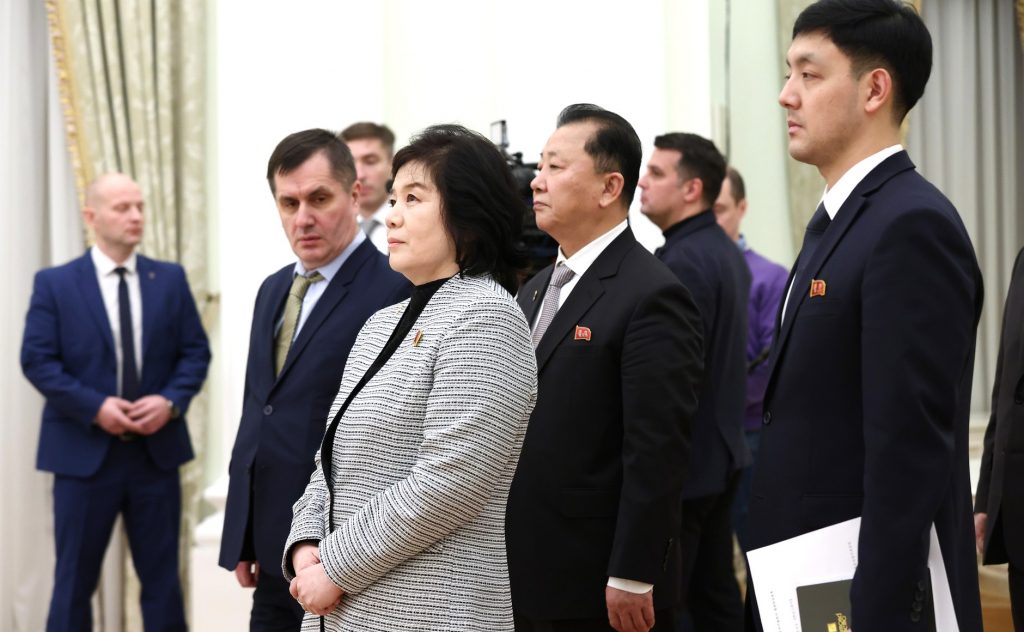
On Tuesday, January 16, Vladimir Putin met with the Minister of Foreign Affairs of the DPRK, Choe Son-Hui, who was in Moscow on a working visit. Notably, neither side published virtually any details about the meeting and its results. It is known that from the Russian side, Foreign Minister Sergei Lavrov and Presidential Aide Yuri Ushakov took part in the meeting. Also, after Putin’s meeting with Choi Song Hui, information appeared that the Russian president plans to visit the DPRK soon.
Outcomes and outlook:
The visit of the DPRK Foreign Minister to Moscow precedes Putin’s trip to Pyongyang (February 12). That is why the visit was ceremonial – to discuss all the details and range of issues raised during the visit. Putin’s expected visit to North Korea will be his first since 2000. Of course, we can expect several essential consequences from it, which will not be limited to strengthening military cooperation.
The Asia-Pacific region is undergoing genuinely fundamental changes. Events of recent years demonstrate that the centre of geopolitical and economic relations is increasingly showing a tilt towards Asia and the Middle East. In this case, Putin’s game attempts to become the conditional “not first, but not second” in the region. Against the backdrop of several states with stronger economies and industrial potential, this task is practically unrealistic, but strengthening ties with conditional rogue states can bring results.
- Meeting with government members
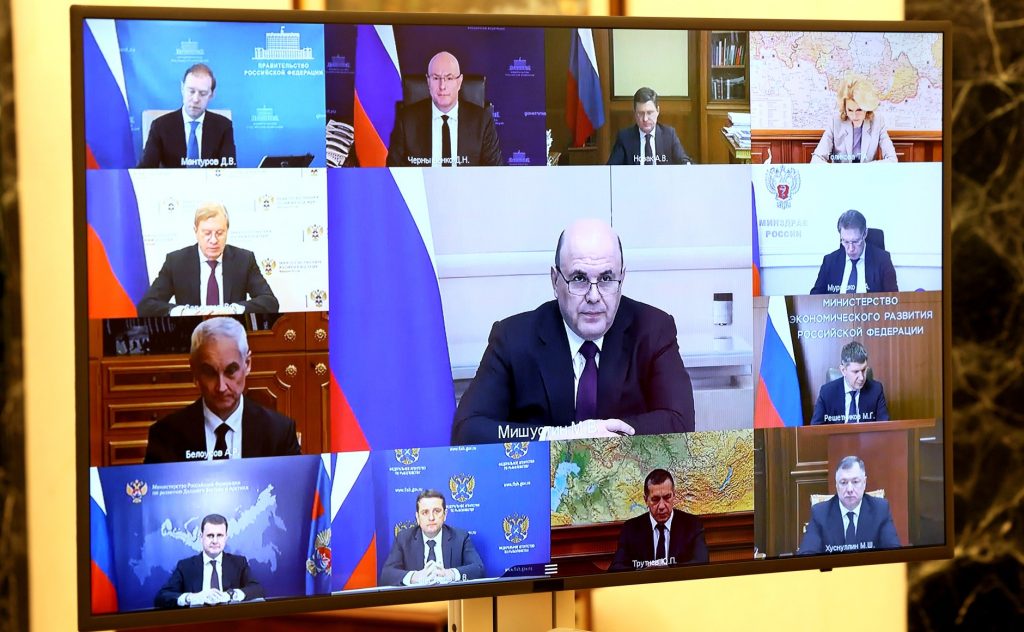
On Wednesday, January 17, a meeting between Vladimir Putin and members of the government took place via videoconference. One of the main topics of the meeting was Putin’s recent trip to the Far East (we wrote about it in the previous digest). Also, the Minister of Economic Development, Maxim Reshetnikov, made a report on the results of the development of the Russian economy in 2023.
Key theses:
- Putin: “Industrial production, construction, agriculture, and tourism showed good indicators and cargo turnover increased. As for construction, we returned to this issue several times; I believe we completed the commissioning of 110.1 million square meters of housing. This, of course, is an absolute record; there has never been anything like it in Russian history. I would like to congratulate the builders on this. This is an excellent indicator.”
- Putin: “True, there are also challenges: inflation is 7.4 per cent. I very much hope that through joint efforts with the participation of the Bank of Russia, of course, we will be able to approach the solution of this problem.”
- Reshetnikov: “Back in 2021, the World Bank identified Russia as the fifth economy in the world and the largest in Europe in terms of purchasing power parity. At the end of 2022, we confidently maintain these positions, and this is even though the World Bank’s calculations are based on early estimates of the growth of our economy for 2021 and 2022.”
- Reshetnikov: “We expect the first estimate of economic growth for 2023 in mid-February, as I said, at the level of 3.5 per cent year on year, as we already estimated at the end of the year. We are a little lower and a little more conservative, but now we estimate it at 3.5 per cent. But if the scale of subsequent adjustments is comparable to previous years, and, according to our indirect estimates, it will not be less, then the final growth estimate could be around 4 per cent, I mean, economic growth for 2023.”
- Reshetnikov: “Growth of real incomes of the population. Over the three quarters of 2023, they grew by 4.4 per cent. At the same time, wages over ten months increased in real terms, as you noted, by 7.7 per cent; if you look at it in nominal terms, it’s more than 13 per cent.”
- Reshetnikov: “Consumer and investment demand is satisfied by growing domestic production. In general, the industry grew by 3.6 per cent over 11 months, and the manufacturing sector of the industry showed significantly higher growth – plus 7.5 per cent.”
- Chekunkov (Minister for the Development of the Far East and Arctic): “The Russian government has begun to develop solutions to all the issues that people raised during your trip to Chukotka and the Khabarovsk Territory. In Anadyr, a large family asked a question that concerns many parents in the Far East about the possibility of extending to Chukotka a program to support large families, which has been implemented in the Primorsky Territory since 2023 when at the birth of a third or subsequent child, a family can reduce their mortgage by 1 million rubles. This is an effective measure; it helps large families quickly resolve their housing issue.”
- Chekunkov: “Over the past year, the cargo turnover of automobile checkpoints in the Far East has more than doubled by 115 per cent, railway checkpoints have increased by 30 per cent, and container turnover has increased by 22 per cent. To handle growing cargo, checkpoints are being modernised. By the end of 2026, 29 checkpoints will be modernised as part of state programs of the Russian Ministry of Transport. As part of developing the entire transport and logistics industry in the Far East, 485 investment projects are being implemented with a total volume of almost 900 billion rubles (893 billion rubles). Of these, 284 billion have already been invested, and 147 projects have been implemented. Eighty per cent of projects are being implemented in border regions.”
- Putin: “The task of traffic cops is not to catch anyone on the roads, but to ensure road safety, reduce road mortality, and reduce the number of accidents. But everything needs to be returned to normal per common sense and the needs of the economy and the relevant industries.”
- Savelyev (Minister of Transport): “In 2023, 32 airlines carried out transportation in the Far Eastern Federal District. And by the end of the year, 2.3 million passengers were transported. I will note that 75 per cent of transportation was carried out by airlines that are members of the Unified Far Eastern Airlines Aurora. Aurora Airlines is increasing its carrying capacity and demonstrating stable growth since 2021, largely thanks to the route subsidy program.”
- Savelyev: “In total, on the territory of the Far Eastern Federal District, there are 80 airfields, of which 11 are international, and 463 landing sites. This year, we plan to operate six facilities – these are four runways in Okhotsk, Beringovsky, Mirny and Polyarny, and two infrastructure facilities in Magadan and Olekminsk.”
Outcomes and outlook:
The traditional meeting between Putin and members of the Russian government is once again intended to emphasise that Putin is the real head of the executive branch. Vital messages within the country: in essence, this is Stalin’s “Life has become better” The growth of the “shares” of Minister Chekunkov and Deputy Prime Minister Trutnev (in conjunction with whom Minister of Economy Reshetnikov works) continues to grow.
At the same time, the issue of the Far East has remained one of the key issues on the Kremlin’s information agenda for the second week in a row. In this context, it is essential to note that this is not only a reason for Putin’s PR on the eve of the elections but also a tangible demonstration of the strengthening of the issue of the development of the Northern Sea Route, which is especially relevant against the backdrop of the crisis in the Red Sea (and the partial blockade of the Suez Canal). Putin can propose a shortcut from Asia to Europe that passes through Russian territorial waters and requires Russian infrastructure. However, the consent of global corporations to such a deal could be very costly for Europe (including Ukraine) and the entire world order.
- Meeting with permanent members of the Security Council
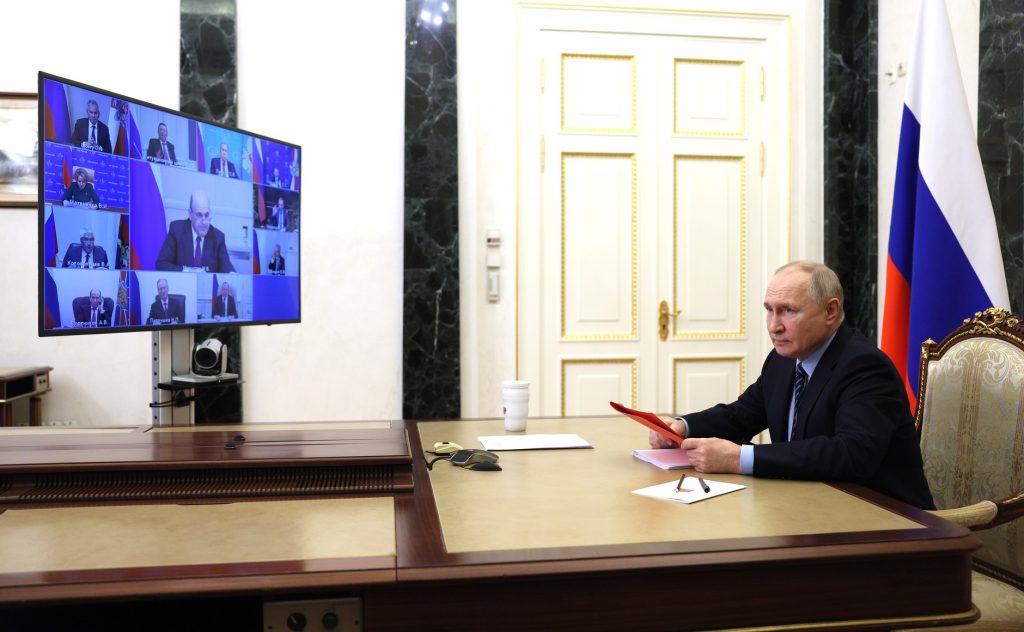
On Friday, January 19, Vladimir Putin held a meeting via videoconference with permanent members of the Russian Security Council. According to the stated agenda of the meeting, its main topic was the discussion of the implementation of the provisions of the Foreign Policy Concept of the Russian Federation. Let us recall that Vladimir Putin signed this Concept on March 31, 2023. The main speaker on the meeting topic was Foreign Minister Sergei Lavrov.
The meeting was attended by Prime Minister Mikhail Mishustin, Chairman of the Federation Council Valentina Matvienko, Chairman of the State Duma Vyacheslav Volodin, Deputy Chairman of the Security Council Dmitry Medvedev, Chief of the Presidential Administration Anton Vaino, Secretary of the Security Council Nikolai Patrushev, Minister of Internal Affairs Vladimir Kolokoltsev, Minister of Foreign Affairs Sergei Lavrov, Defense Minister Sergei Shoigu, Director of the Federal Security Service Alexander Bortnikov, Director of the Foreign Intelligence Service Sergei Naryshkin, Special Representative of the President on environmental issues, ecology and transport Sergei Ivanov.
Outcomes and outlook:
According to Ascolta, Putin demanded more active work in the international direction from his entourage and the Foreign Ministry. “We must get out of the defensive state; we must go on the offensive on all foreign policy fronts, and the past year has given us reason to say that such a strategy is ripe.” According to reports, even before the presidential elections, the Foreign Ministry must provide an action plan to strengthen its position in the world: in addition to strengthening cooperation within the BRICS, with China, in the regions of Africa, the Middle East and Central Asia, Putin asked to develop a concept of interaction with Europe and a concept of possible compromises from the USA.
If this information is confirmed, soon, we may witness severe transformations in the Kremlin’s foreign policy positions and a softening of rhetoric regarding several of the most pressing issues. In this case, there is no point in saying that the Kremlin has lost or is making a concession—it’s too early to relax. Instead, we are talking about reaching new, more global agreements within the framework of which fundamental changes in the agenda in the geopolitical arena are expected.
- Press conference of Sergei Lavrov on the results of the activities of the Russian Ministry of Foreign Affairs
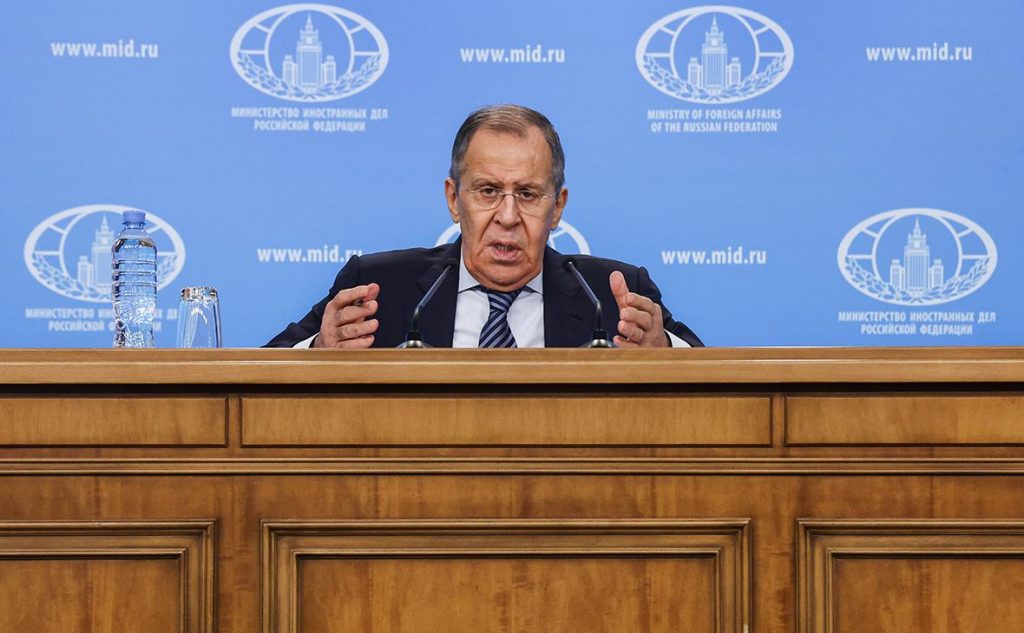
В четверг, 18 января, Министр иностранных дел Сергей Лавров провел пресс-конференцию по итогам деятельности российской дипломатии в 2023 году. Во время общения с представителями СМИ глава российской дипломатии повторил ряд тезисов, ранее активно используемых для формирования позиции в отношении Запада, а также очертил планы и перспективы для внешней политики РФ на 2024-й год.
Key theses:
- “The West has proven its complete inability to negotiate and its unreliability as partners in any endeavour. The world majority does not want to put up with such a selfish approach and wants to develop in full accordance with its national interests, with the interests of each country and with full respect for the principles of the UN Charter, starting with respect for the sovereign equality of the state.”
- “On the foreign policy front, we have clearly defined guidelines for the development of relations with those who are ready to do this on an equal, mutually beneficial, mutually respectful basis through frank dialogue, negotiations aimed at finding a balance of interests, and not decisions that meet exclusively someone’s one-sided selfish interests.” plans, as is overwhelmingly evident in discussions involving the West, led by the United States.”
- “Yes, to rule the whole world for 500 years and not have any serious competitors during almost this entire period (with the possible exception of the Soviet period) probably helps one get used to the role of hegemon. But life is moving forward, new centres of economic growth, financial power, and political influence are emerging and have already become stronger, significantly ahead in their development of the United States and other Western countries.”
- “We are taking our partnership with African countries to a truly strategic level. This was confirmed at the second Russia-Africa summit held in July 2023 in St. Petersburg.”
- “I would like to note a significant event – the adoption at the 78th session of the UN General Assembly of the resolution “Combating the glorification of Nazism, neo-Nazism and other practices that contribute to the escalation of modern forms of racism, racial discrimination, xenophobia and related intolerance.” Despite the tricks of the West, it was accepted by an overwhelming majority of votes. But I would like to emphasise that Germany, Italy and Japan voted against this document for the second time in a row. The Axis countries, which at one time, after the defeat in World War II, publicly repented for the crimes committed during that war and assured everyone that this would not happen again.”
- “Russia, which has assumed the chairmanship of BRICS since January 1, 2024, will pay special attention to ensuring that newcomers and recruits fit organically into the overall work and thereby contribute to the strengthening of positive trends not only within the association as such, but also on the international arena in the interests of the World Majority. Considering that more than 20 (even closer to 30) countries are interested in rapprochement with BRICS, we see a great future for this association with a global composition of participants.”
- “The West would like to have more flexibility. They, apparently, have already realised that the much-advertised “blitzkrieg” with the ultimate goal of inflicting “strategic defeat” on Russia is all an illusion, and the situation has changed dramatically. First of all, in Western minds. They admitted their mistake. It’s hard to admit. This is expressed in the fact that they are now looking for some kind of external signals that will allow them to support Ukraine and, on the other hand, push Kyiv to become more accommodating and listen to its Western bosses. It’s hard to say to what extent this will be implemented.”
- “We do not object to the agreements other countries enter into with Ukraine. But this does not change our goal at all. President Vladimir Putin recently confirmed this. We will consistently and persistently achieve the [so-called] “special military operation” goals. We will achieve them.
- “By the way, back in September 2023, National Security Adviser to the US President Jake Sullivan stated that the situation in the Middle East has never developed as calmly as over the past couple of years. A month later, conflict broke out in the Gaza Strip. Here, we must rely on collective work, which the United States has already lost the habit of. They are used to dictating.”
- “We, as you know, did not put up with the use of the Kyiv regime as an instrument for creating direct threats to our security, and not somewhere across the ocean, but directly on the borders of our country. They did not put up with the use of the Kyiv regime for a frontal attack on everything Russian: language, education, culture, people who lived for centuries in the territories developed by their great-grandfathers and great-great-grandfathers and always remained Russian land, part of the Russian world. They wanted to turn Kyiv into a tool for destroying this history and common memory and destroying any ties between the Russian and Ukrainian peoples. This is also a direct threat to our interests.”
- “We consider American ideas unacceptable. When talking about strategic stability, they do not hide their intentions to “bracket” the non-nuclear component of military confrontation, non-nuclear forces. The goal is obvious – thereby consolidating the serious quantitative advantage that the “collective West” has in this area. In the context of Washington’s hybrid war against Russia, we do not see any basis for additional joint measures in the field of arms control and strategic risk reduction but also in general for any conversation with the United States about strategic stability.”
- “Rumors are rumours. Everyone understands that it is not Ukraine that will decide when to stop and start talking seriously about realistic conditions for ending this conflict. This presupposes a renunciation of Nazi ideology, Nazi rhetoric, racism towards everything Russian, and entry into NATO. These are not sky-high dreams, but indispensable conditions for preserving the Ukrainian people as independent, having their own identity, and not carrying out someone’s “orders” to bring Russia into a turbulent state.”
- “About the fact that Putin played a role in the reconciliation of Baku and Yerevan, and not French President Macron. The agreement was signed by three leaders – Russia, Armenia and Azerbaijan. I did not see Macron’s signature. Just like other trilateral agreements – Russian-Armenian-Azerbaijani.”
- “You know, [the so-called] “special military operation” has long had very positive effects on our inner life. It united our society in an unprecedented way and contributed to its cleansing of people who did not feel involved in Russian history and culture. Some of them left, some stayed and began to think. But the overwhelming majority of society has rallied like never before.”
- “The Israelis cannot even be given the impression that because they suffered in World War II, they can do anything today. Yes, there was a Holocaust. This is a terrible crime. But there was also genocide of all peoples of the Soviet Union. They suffered no less. They were exterminated in a variety of concentration camps, including in Leningrad, along with the Jews. According to this logic, we should now be able to do everything; everything is permitted. This is not good systemically if we want to preserve international law.”
Outcomes and outlook:
Many experts perceive the final press conference of Sergei Lavrov on the results of 2023 as the “swan song” of Lavrov, who is predicted to resign after the 2024 presidential elections. But overall, Lavrov painted a bravura picture in the style of “We are stronger than ever.” In any case, the theses voiced during this press conference will form the basis of recommendations for agitators leading a campaign to promote Vladimir Putin for the next presidential term.
At the same time, Lavrov’s press conference took place on the eve of his next visit to the United States, where he is to participate in debates at a special session of the UN General Assembly. It is important to note that in addition to public events, several private meetings between Lavrov and many diplomats from the United States and Europe are expected in New York. Moreover, several sources claim that there is an almost wholly agreed position between Moscow and Washington regarding Palestine. Next week will be rich in geopolitical news.
- Explosions in the Leningrad region
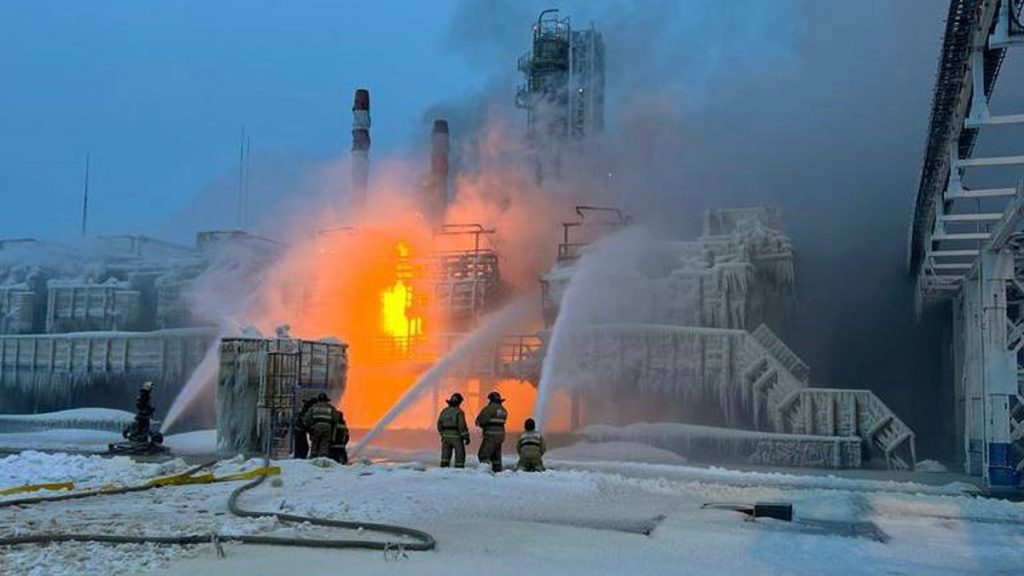
On Thursday, January 18, the Russian Ministry of Defense, for the first time since the beginning of Russia’s full-scale invasion of Ukraine, announced the interception of a UAV over the territory of the Leningrad region. According to media reports, residents of houses on Vasilyevsky Island in St. Petersburg heard the sounds of explosions. Later it became known about disruptions at Pulkovo Airport, which was forced to stop operations due to the introduction of the “Carpet” plan.
Sometime later, Ukrainian media, citing anonymous sources, reported that several Ukrainian drones attacked an oil depot in the Leningrad region on the night of January 18. The press also called this a special operation of the Main Intelligence Directorate of the Ministry of Defense of Ukraine (GUR).
Notably, the distance from Ukraine to St. Petersburg is at least 900 kilometres, which makes this attack the longest in terms of distance. Already, this is provoking many questions and rumours about both the work of Russian air defence and the UAV launch point.
Outcomes and outlook:
An important point was that the Ukrainian drone reached the Leningrad region (that is, targets more than 1,200 km from the borders of Ukraine came under attack). This will expand the geography of arrivals and the range of action of Ukraine’s military assets. The vulnerability of Russian air defence systems has been demonstrated. Ukraine has shown that in the current conditions, it will return to the tactics of targeted attacks on Russian infrastructure (the “thousand cuts” tactic). It is also essential that Russia believes that the drone was launched from the territory of Estonia (a NATO member state). If this fact is proven, it could aggravate the conflict between Russia and NATO up to real military clashes between Russia and NATO.
At the same time, there was no conditional response from the Russian side, which often consisted of a massive missile launch across Ukrainian territory. On the one hand, this can be associated with Lavrov’s visit to the United States and strengthening the Kremlin’s position in the foreign policy arena – a conditional attempt to demonstrate peacekeeping intentions. At the same time, several sources note that the shelling of Russian territory itself, using British and French UAVs or missiles (which is not officially confirmed), was already a response to the recent destruction of targets in Ukraine. In any case, such details are unlikely to become known shortly.
- Sentence to Igor Strelkov
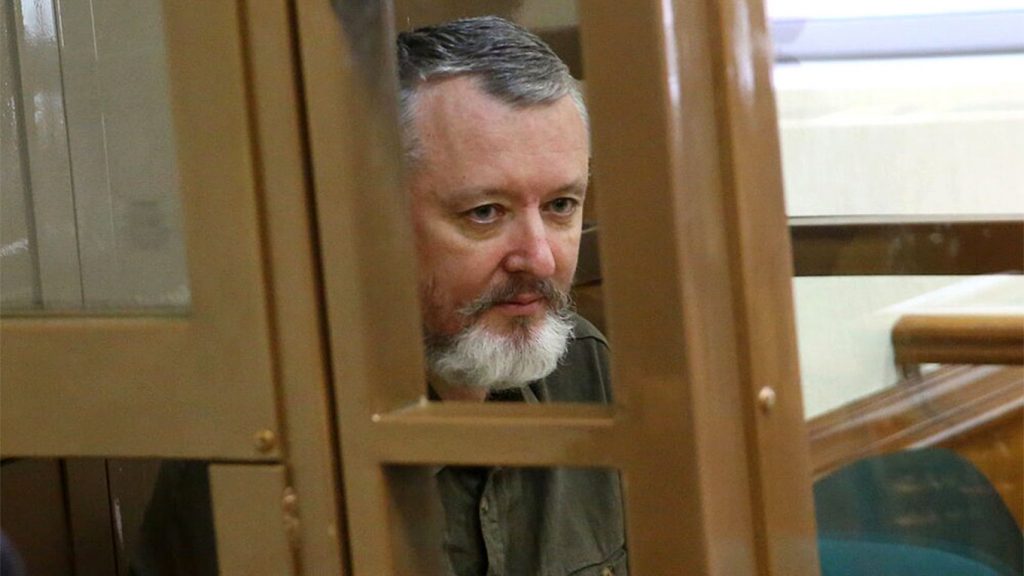
On Thursday, January 18, the Moscow City Court held a regular hearing in the case of the former commander of the DPR separatists, FSB reserve colonel Igor Strelkov (Girkin). During the hearing, the prosecution requested from the judge a sentence of four years and 11 months in a general regime colony in the case of calls for extremism. The verdict will be announced only on January 25, but it is important to note that the requested term is close to the maximum punishment under the article charged to Strelkov – five years in prison. Considering that the case against Strelkov is political, it can be assumed that the court will grant the prosecution’s request or make a minor reduction.
Let us remind you that Strelkov has been in jail since July 2023. He was placed there because of charges of calls for extremism. He was accused because of two entries in a telegram channel. One contained the phrase “It’s not enough to shoot for this” – it was about officials who, in Strelkov’s opinion, were preventing monetary payments to war participants. The investigation saw in it a call to extremism. Strelkov did not admit guilt.
Also, while in pre-trial detention, Strelkov announced his candidacy for the presidency of Russia, but his supporters failed to hold a meeting to nominate his candidacy in compliance with all the rules. It is alleged that not a single notary agreed to attend.
Outcomes and outlook:
The case of Igor Strelkov and the verdict handed down in his case show that Putin does not stand on ceremony with people who break subordination and obedience – regardless of previous merits. Strelkov was the hero of the Russian media in 2014. Still, he then turned into a self-centred person suffering from megalomania, demanding special treatment and complaining that he was not listened to. Moreover, from the point of view of the Russian leadership, Strelkov, bringing discord and confusion into the information space, turned out to be dangerous. Strelkov’s former patrons hastened to abandon him. Thus, he simply turned out to be of no interest to anyone – he had no supporters, followers, or defenders.

